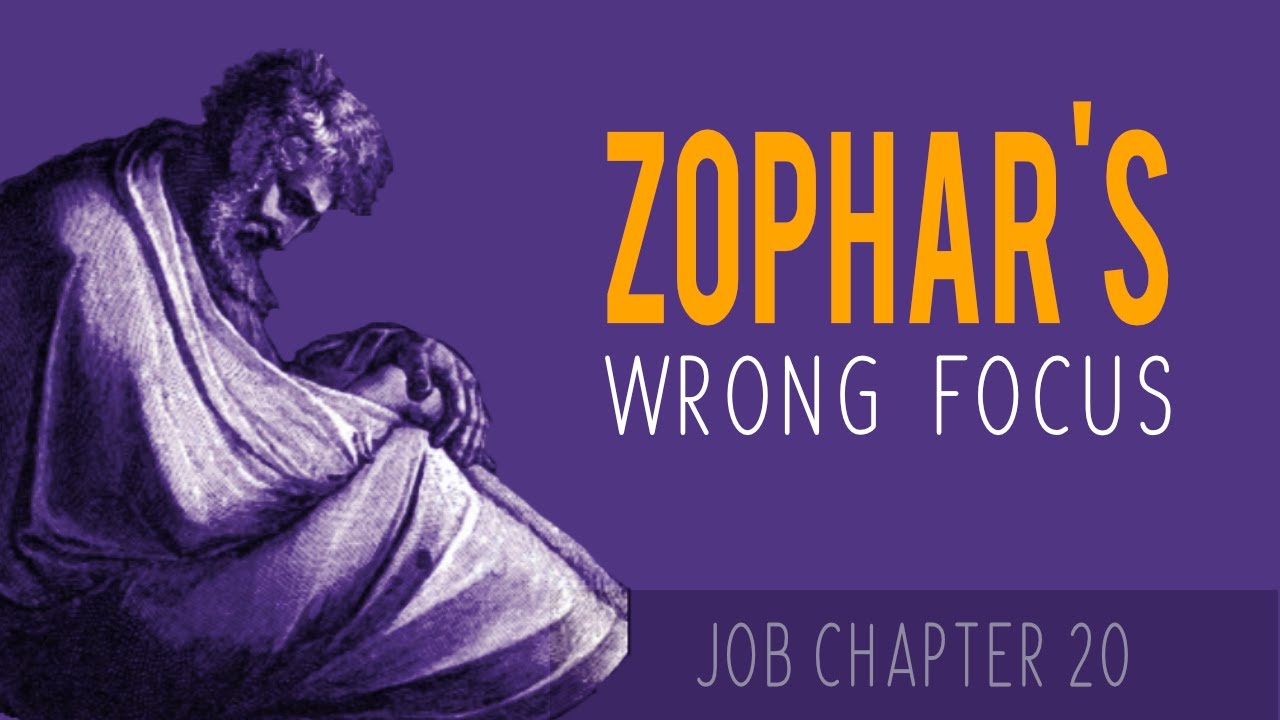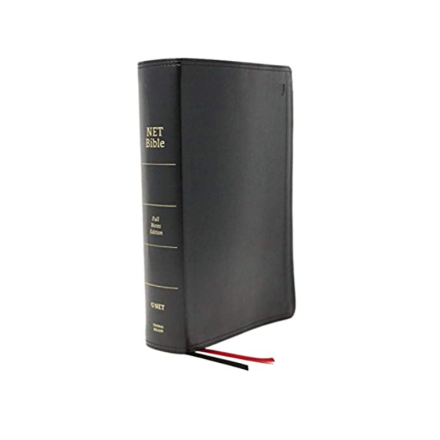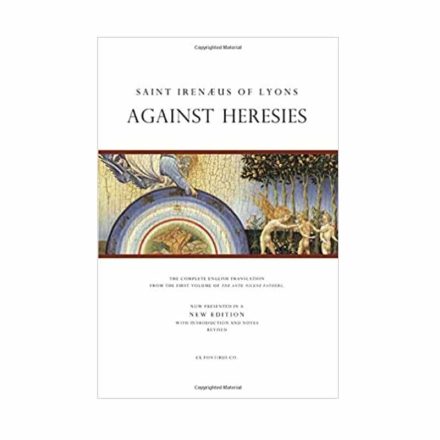Podcast (bible-study): Play in new window | Download | Embed
Subscribe: Apple Podcasts | Google Podcasts | Spotify | Amazon Music | Android | Pandora | iHeartRadio | Podchaser | Email | Deezer | RSS | More
Job 20: The Danger of Having a Wrong Focus

20 Then Zophar the Naamathite answered:
2 “This is why my troubled thoughts bring me back—
because of my feelings within me.
3 When I hear a reproof that dishonors me,
then my understanding prompts me to answer.
The first thing we notice about Zophar’s response is that he is responding out of a place of turmoil and upset and it is this upset that is prompting his second response. The NET study Bible has a note on verse 2, on the word “feelings” the commentator writes:
The word is normally taken from the root “to hasten, and rendered “because of my haste within me.” But K&D 11:374 proposed another root, and similarly, but closer to the text, E. Dhorme (Job, 289-90) found an Arabic word with the meaning “feeling sensation.” He argues that from this idea developed the meanings in the cognates of “thoughts” as well. Similarly, Goris translates it “my feeling pain.” See also Eccl 2:25.[1]
We see that Zophar is responding from a tumultuous state. He thinks he is bringing the truth about God’s justice and righteousness and that the wicked will be judged. That is true, in the end, the wicked and those who continue in their rebellion against God will be judged. No one will get away with anything because God is perfectly righteous and perfectly just.
However, sometimes people can use the truth to tell a lie, and I think this is what we are seeing in this situation. Zophar was the first to directly condemn Job and speak harshly to him. Zophar thought he knew the true circumstances when he didn’t really, he didn’t see the whole picture. And now, when Job refuses to agree with him, Zophar continues on.
There are times when things need to be said. We see in both the Old Testament and the New the writers calling God’s people to account, pointing out their wrongs. Jesus called out the hypocrisy of the Pharisees and warned them to repent. Confrontational words of warning can be from God, but they aren’t always. Sometimes we claim the authority of God to judge a situation when we are just as clueless as Zophar.
Disaster strikes. Job doesn’t understand why it is happening. He doesn’t know him or have a personal revelation at this point, but he believes in a just God who is good who will vindicate him. Job challenges this God he has trust in to show him his wrong if he has erred, and if not, he wants justice. In the pantheon of gods, Job confidently states in chapter 16 that there is one interceding for him like a friend.
4 “Surely you know that it has been from old,
ever since humankind was placed on the earth,
5 that the elation of the wicked is brief,
the joy of the godless lasts but a moment.
6 Even though his stature reaches to the heavens
and his head touches the clouds,
7 he will perish forever, like his own excrement;
those who used to see him will say, ‘Where is he?’
8 Like a dream he flies away, never again to be found,
and like a vision of the night he is put to flight.
9 People who had seen him will not see him again,
and the place where he was
will recognize him no longer.
Everything Zophar is saying here is true. It is absolutely true. The godless, even those who put on a show of being Godly, put their trust in what they have and what they can control and think they will never be called to account. But they will be.
10 His sons must recompense the poor;
his own hands must return his wealth.
I think we see here that Zophar is convinced that Job operated unscrupulously in his business dealings. We saw in Zophar’s first response that he mentioned that exploitation and wrong dealings in business endeavors could bring judgment. He brings it up again in his second response. Zophar seems pretty convinced that Job’s wealth was due to some underhanded dealings.
What Zophar says here is that recompense is due for the injustice. This brings up the issue of identificational repentance. We have a lot of drama in the U.S. currently about whether or not a person needs to repent for the sins of their ancestors.] Many books have been written and many sermons preached that boil down to the attitude “We don’t have to apologize for nothing.” A lot of pastors and “Christian” thought leaders have been encouraging people in obstinate pride and rebellion against the conviction of the Holy Spirit, not only in their own lives, but in the collective actions of us as a society. We have people promoting the idea that since salvation is individual, that we don’t need to be concerned with anyone other than ourselves.
I hope when I write it out that way that it is seen as shocking as it is for someone claiming to be a Christian to promote those type of beliefs, because that is nothing but doctrine straight from the pit of hell.
Yes, we are saved individually, we each have to make a personal choice and come on our own just as we are to decide to follow Christ. But the plan of salvation does not end with us individually, that begins with us. God’s plan is not top down, it is bottom up. Otherwise, God’s story would have ended at Mt. Sinai. He had given the law, told his people how to behave, and … if laws and judges could fix the problem … that would have been that. Laws and decrees are not the answer to the problem of the human condition.
The problem is the human heart, our self-focus and pride. Because we are self-focused, we can’t truly be in community with anyone else, let alone with God. God’s plan is not to bring isolated individuals to himself, but to form a “people” for himself to give Him, praise. A people … a group … a collective. This is the church, the body of Christ, made up of various parts working together, just like the rest of God’s creation, that are not self-focused, but Christ-focused. A people with a “new heart,” that thinks of others as better than themselves and who, like Christ, are willing to lay down their life for a friend.
So this #MeFirst religion that is being promoted so often today is another gospel and another religion, it is not the Gospel of Christ.
The other warning flag in this false gospel is the denial of the need for identificational repentance. Zophar points out that the debt must be repaid by the descendants. The judgment is generational. Zophar is right about this. Just as God’s plan is to redeem man collectively by starting individually, judgment can come through the community sin. There is no clearer picture of this than Yom Kippur, the Day of Atonement. That day is for atonement for the nation, atonement for any unintentional sins in the community that hadn’t already been atoned for by the individual. Moses repeatedly interceded on behalf of the Israelites in the wilderness. When the 70 years of Babylonian exile was almost up, Daniel repented for the sins of his people, which he obviously hadn’t participated in himself, and asked God to remember them and not to delay in his promise to restore and deliver them.
Not only is repentance required for personal salvation, but it is required to break the bonds of judgment upon us from those of our ancestors. This is Biblical. God tells us that he will visit the sins of the fathers upon the third and fourth generations. This is individual as well as collective. The Israelites were banned from the land because of collective sin as a nation. So much of our turmoil today in the U.S. is from the collective sins, the injustice and exploitation, of generations that came before us.
These unconfessed wrongs not only have a collective impact but long-lasting personal impact. I used to volunteer in a prayer ministry that prayed for people for physical and emotional healing. Sometimes the root of the issue was a personal wrong, but not always. What was very clear to me was that there were a lot of people who were dealing with “stuff” that wasn’t their own, judgment brought and bondage created either from generations before or unwitting associations. I recently read a book called Origins that addresses this issue.
But what is the answer … we have to repent. We have to acknowledge the wrong … not deny it … and repent. Stop doing it. Turn around. Ask God to forgive us, and he has promised that he will (1 John 1:9, 2 Chronicles 7:14).
Again, Zophar is speaking truth here, but he is not seeing that he is misjudging Job because he is coming with wrong motivations. Zophar continues with the fate of those who trust in themselves rather than in God:
11 His bones were full of his youthful vigor,
but that vigor will lie down with him in the dust.
12 “If evil is sweet in his mouth
and he hides it under his tongue,
13 if he retains it for himself
and does not let it go,
and holds it fast in his mouth,
The man knows his actions are wrong, but finds pleasure in it.
14 his food is turned sour in his stomach;
it becomes the venom of serpents within him.
15 The wealth that he consumed he vomits up,
God will make him throw it out of his stomach.
16 He sucks the poison of serpents;
the fangs of a viper kill him.
The godless man holds on to the sin and these things that he thinks are good and will benefit him, but in reality, they are poisoning his life. Wealth can be a blessing from the Lord, but gained in the wrong way or when it has an improper place in our life, it can ruin us.
17 He will not look on the streams,
the rivers that are the torrents
of honey and butter.
18 He gives back the ill-gotten gain
without assimilating it;
he will not enjoy the wealth from his commerce.
All these benefits the unscrupulous person thinks he will gain by his actions will slip through his fingers.
19 For he has oppressed the poor and abandoned them;
he has seized a house which he did not build.
20 For he knows no satisfaction in his appetite;
he does not let anything he desires escape.
Avariciousness consumes the man. He is focused on acquiring and consuming things, and so things become his master and in the end consume him.
21 “Nothing is left for him to devour;
that is why his prosperity does not last.
22 In the fullness of his sufficiency,
distress overtakes him.
The full force of misery will come upon him.
Regardless of how much you gain, there will be an end to “things.” We can only find peace when we seek after and put our trust in the One who is eternal and everlasting.
23 “While he is filling his belly,
God sends his burning anger against him,
and rains down his blows upon him.
24 If he flees from an iron weapon,
then an arrow from a bronze bow pierces him.
25 When he pulls it out and it comes out of his back,
the gleaming point out of his liver,
terrors come over him.26 Total darkness waits to receive his treasures;
a fire that has not been kindled
will consume him and devour what is left in his tent.27 The heavens reveal his iniquity;
the earth rises up against him.
28 A flood will carry off his house,
rushing waters on the day of God’s wrath.
29 Such is the lot God allots the wicked,
and the heritage of his appointment from God.”
Zophar points out that the man who does not fear God and who puts his trust in himself will come to a bad end. He has only himself to rely on for protection, not God, and that will fail him. He has to fear betrayal and attacks from all those other people who are just looking out for themselves. All the things he has acquired, will in the end do him no good.
Heaven will judge. His iniquity, those accumulated sins, will be revealed.
He will have a day of judgment and see the “heritage of his appointment with God.”
This is truth.
This Bible study is part of A Study of Job (2021)
Endnotes
- [1] NET Bible, Full-notes Edition. (Nashville, TN: Thomas Nelson, 2019). Note J on Job 20.




